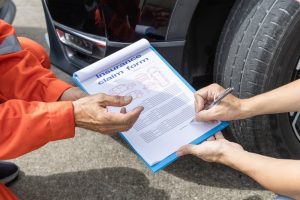When a Florida driver is injured in a car accident involving an uninsured or underinsured motorist (UM), they often look to their insurance policy for coverage. In the Sunshine State, policyholders can sometimes use “stacking” to expand their coverage limits, maximizing the benefits they receive in such cases. Stacking allows drivers to combine the UM coverage from multiple vehicles or policies to increase their payout.
While stacking sounds like a surefire way to maximize compensation, there are key limitations under Florida law, especially when the accident involves non-stacking commercial policies or coverage on non-owned vehicles. A skilled car accident lawyer can help you navigate these complexities and understand how these rules impact your ability to secure the compensation you need after a crash.
Understanding Auto Insurance Stacking in Florida
Stacking insurance benefits allows policyholders to increase their UM coverage by combining multiple policies or their coverage across several vehicles under a single policy. This is particularly helpful in cities like Miami, Fort Lauderdale, or West Palm Beach, where traffic congestion and the high density of vehicles increase the likelihood of accidents.
Here’s an example of how stacking can work: Let’s say you own two cars, each with a $50,000 UM policy. If an uninsured driver injures you, you might stack your coverage to receive $100,000 instead of being limited to a single policy’s coverage limit.
Stacking Options in Florida: Single Policy vs. Multi-Policy Stacking
Florida drivers have two main stacking options:
- Within the Same Policy: Multiple vehicles listed on a single policy can have their UM limits combined.
- Across Different Policies: If you have multiple policies (for example, one policy for your car in Miami and another for your car in Fort Lauderdale), you can potentially combine the UM coverage across these policies.
In the event of an accident in an area like South Beach, stacking across policies could mean receiving far more compensation for medical expenses and lost income than would otherwise be available under a single policy.
Limitations on Auto Insurance Stacking in Florida
While stacking can increase potential payouts, there are restrictions to consider:
- Policy Exclusions for Non-Stacking: Some policies explicitly exclude stacking. This commonly occurs in non-stacking commercial policies, which are designed to cover only specific, business-related liabilities and not to combine with other policies.
- Owned vs. Non-Owned Vehicles: If you’re driving a vehicle that is not insured in your name at the time of the accident, stacking may not apply.
- Out-of-State Policies and Travel: Florida’s approach to stacking is distinct from other states. If you are a Florida resident injured while traveling out of state, you may face limitations on stacking UM coverage, depending on the specifics of your policy.
Knowing the specifics of your policy can make a significant difference in how you approach your claim and maximize the benefits available to you.
Real Case Example of Stacking Limitations in Florida
A recent Florida appellate court decision highlights these limitations. In this case, plaintiffs were injured in a crash caused by an uninsured motorist. Although they held multiple personal policies with stackable UM coverage, they attempted to recover benefits from both these policies and an additional non-stacking commercial policy.
However, since they had already chosen to receive benefits from their personal policies, the court prevented them from receiving additional benefits from the commercial policy, as it was non-stackable and covered a vehicle not owned by the plaintiffs.
How Modified Comparative Fault Affects Stacking in Florida
Florida follows a modified comparative fault rule, meaning that your ability to recover damages after an accident is directly tied to your level of responsibility for the incident. In Florida, you can recover damages as long as you’re not more than 50% at fault. However, any compensation you receive will be reduced in proportion to your degree of fault. This rule also affects stacked coverage because it applies to your overall compensation amount, including any benefits you may receive through stacking.
For example, suppose you’re injured in a car accident on I-95 in Fort Lauderdale, and you’re found to be 25% at fault. If you stack your UM coverage across two vehicles to reach a total of $100,000, you’d still be eligible to receive 75% of that amount due to your fault percentage, totaling $75,000. Stacking can increase your overall coverage limit, but it’s essential to understand that Florida’s comparative fault rule will apply to the final recovery amount.
Insurance companies may use this rule to argue for a higher percentage of fault on your part, especially in cases where significant benefits are available through stacking. For instance, they might scrutinize every detail to show that your actions contributed to the accident. That’s why it’s crucial to work with a legal professional who can protect your interests, counter these arguments, and present evidence to minimize any fault assigned to you.
Why Insurance Companies Fight Stacking Claims
Insurance companies often resist stacking claims because they increase the potential payout on a single claim, leading to greater financial liability for the insurer. Here are some common tactics insurers use to challenge stacking claims in Florida:
- Arguing Policy Exclusions or Non-Stacking Clauses: Many policies have specific exclusions or language that prevent stacking. Insurers may point to these clauses to argue that your policy is non-stackable, even if you have multiple vehicles insured. They might rely on complex legal language to justify denying stacked benefits.
- Highlighting Fault or Liability Disputes: Insurers may attempt to place a higher percentage of blame on the claimant. Since Florida’s modified comparative fault rules reduce compensation based on the insured’s percentage of fault, insurers might argue that you bear partial or majority responsibility for the accident to limit or deny stacked benefits.
- Questioning Coverage Applicability: Insurers sometimes dispute whether a particular vehicle or policy qualifies for stacking. For example, if you’re driving a vehicle not listed under a stackable policy or a rental, they might argue it’s ineligible for stacked benefits, even if other vehicles in your household have UM coverage.
- Using Delay Tactics and Legal Loopholes: Insurance companies know that complex legal processes can deter claimants from pursuing full benefits. By delaying claim reviews or raising technicalities, they can discourage policyholders from pushing for stacked coverage.
These tactics emphasize the importance of having knowledgeable legal support. An experienced attorney can help counter these strategies, helping to ensure you receive the benefits you’re entitled to under Florida law.
Common Scenarios with Stacking and Non-Stacking Limitations in Florida
Florida’s insurance laws around stacking and non-stacking policies can lead to different outcomes depending on specific circumstances. Here are a few common scenarios where stacking limitations often come into play:
Accidents in Rental or Borrowed Vehicles
If you’re driving a rental car from Orlando International Airport or borrowing a friend’s vehicle in Jacksonville and get into an accident with an uninsured motorist, stacking may not be an option. Since the vehicle isn’t listed on your personal insurance policy and you don’t own it, your ability to stack UM coverage could be limited. In such cases, you may only be able to access the UM coverage available on the rental agreement or the owner’s policy, which may not allow stacking.
Injuries While Driving a Company Car with a Non-Stacking Commercial Policy
Suppose you’re driving a company vehicle insured under a non-stacking commercial policy when an accident occurs on the Florida Turnpike near Boca Raton. Commercial policies often include clauses that prohibit stacking. Even if you have multiple personal auto policies with stackable UM coverage, you may be restricted to the non-stackable benefits of the commercial policy or have to choose between one or the other, but not both.
Multi-Vehicle Households with Excluded Vehicles
For families in suburban areas like Weston or Palm Harbor, owning multiple vehicles is common. If all your vehicles are insured under the same policy with stacking UM coverage, you generally can combine the coverage limits. However, if a family member buys a new car and forgets to add it to the policy before an accident on U.S. Highway 19, stacking might not apply. The vehicle involved must be listed on the policy to benefit from stacking.
Accidents Involving Motorcycles
Motorcycles are popular in coastal areas like Daytona Beach. However, motorcycle insurance policies in Florida often have different rules regarding UM coverage and stacking. If you’re injured while riding a motorcycle not listed on your stackable auto policy, you may face limitations in stacking UM benefits from your car insurance policies.
Out-of-State Accidents
If you’re a Florida resident traveling to neighboring states like Georgia or Alabama and are involved in an accident, stacking rules can become even more complicated. Your ability to stack UM coverage may depend on both Florida law and the laws of the state where the accident occurred. Insurance companies may argue that stacking isn’t applicable due to jurisdictional differences.
Non-Resident Relatives and Policy Definitions
Imagine your college-aged child, who attends the University of Florida in Gainesville, borrows a friend’s car and gets into an accident. If they’re not considered a resident relative under your policy definitions, stacking may not be permitted. Insurance companies may use policy language to exclude coverage in these situations.
When Stacking Isn’t Possible: Other Coverage Options
If stacking is off the table, here are other ways to pursue compensation:
- Personal Injury Protection (PIP): Florida requires PIP coverage, which will cover some of your medical expenses and lost income.
- Health Insurance: For out-of-pocket expenses, health insurance can often cover some costs if auto insurance falls short.
- MedPay Coverage: Optional in Florida, MedPay can provide additional benefits, especially if stacking UM coverage isn’t available.
Time Limits on Filing Claims in Florida
In Florida, it’s crucial to understand the difference between filing a civil lawsuit and submitting an insurance claim after an accident. When it comes to civil lawsuits, Florida law typically allows you up to two years to file a personal injury lawsuit for car accidents, wrongful death claims, or cases involving uninsured motorist coverage. This two-year statute of limitations applies specifically to bringing a civil lawsuit in court, meaning that if you don’t file within this timeframe, you may lose the right to seek damages through the courts altogether.
However, when it comes to filing an insurance claim, it’s best to act much sooner. While Florida law doesn’t impose a strict statutory deadline on insurance claims, most insurance policies include language that requires prompt notification. Insurance companies expect policyholders to report accidents as soon as possible—typically within a matter of days or weeks. Filing promptly gives the insurer time to investigate the accident and process your claim, helping ensure you receive the coverage and benefits available under your policy.
Waiting too long to file an insurance claim could result in complications. For instance, delays in reporting an accident may lead the insurance company to question the validity of your claim or even deny coverage based on “late reporting.” Additionally, the sooner you file, the sooner you can access funds for medical bills, vehicle repairs, and other accident-related expenses.
In short, while you may have up to two years to file a lawsuit, it’s essential to notify your insurer immediately following an accident to avoid jeopardizing your ability to recover benefits. Acting promptly with both your insurer and, if necessary, the courts can help maximize your chances of securing full compensation.
Seek Legal Support to Maximize Your Recovery
Auto insurance stacking can offer a lifeline in the aftermath of a serious accident, especially when facing uninsured or underinsured motorists on Florida’s highways, such as I-95 or I-75. However, understanding the limitations of stacking in Florida is essential for maximizing the compensation you may be entitled to.
The laws governing insurance stacking and recovery options can be complex, and insurance companies often resist paying stacked claims. To protect your rights and ensure you receive the full benefits you’re entitled to, contact an experienced attorney who knows the ins and outs of Florida’s UM coverage laws. At Frankl Kominsky Injury Lawyers, we pride ourselves on providing personalized legal guidance to car accident victims throughout South Florida.
If you’ve been injured in a car accident, our personal injury lawyers can help. Contact us today at (561) 800-8000 or through our online form for a free consultation. We don’t get paid unless we help you recover compensation for your injuries.
 South Florida Injury Attorneys Blog
South Florida Injury Attorneys Blog




